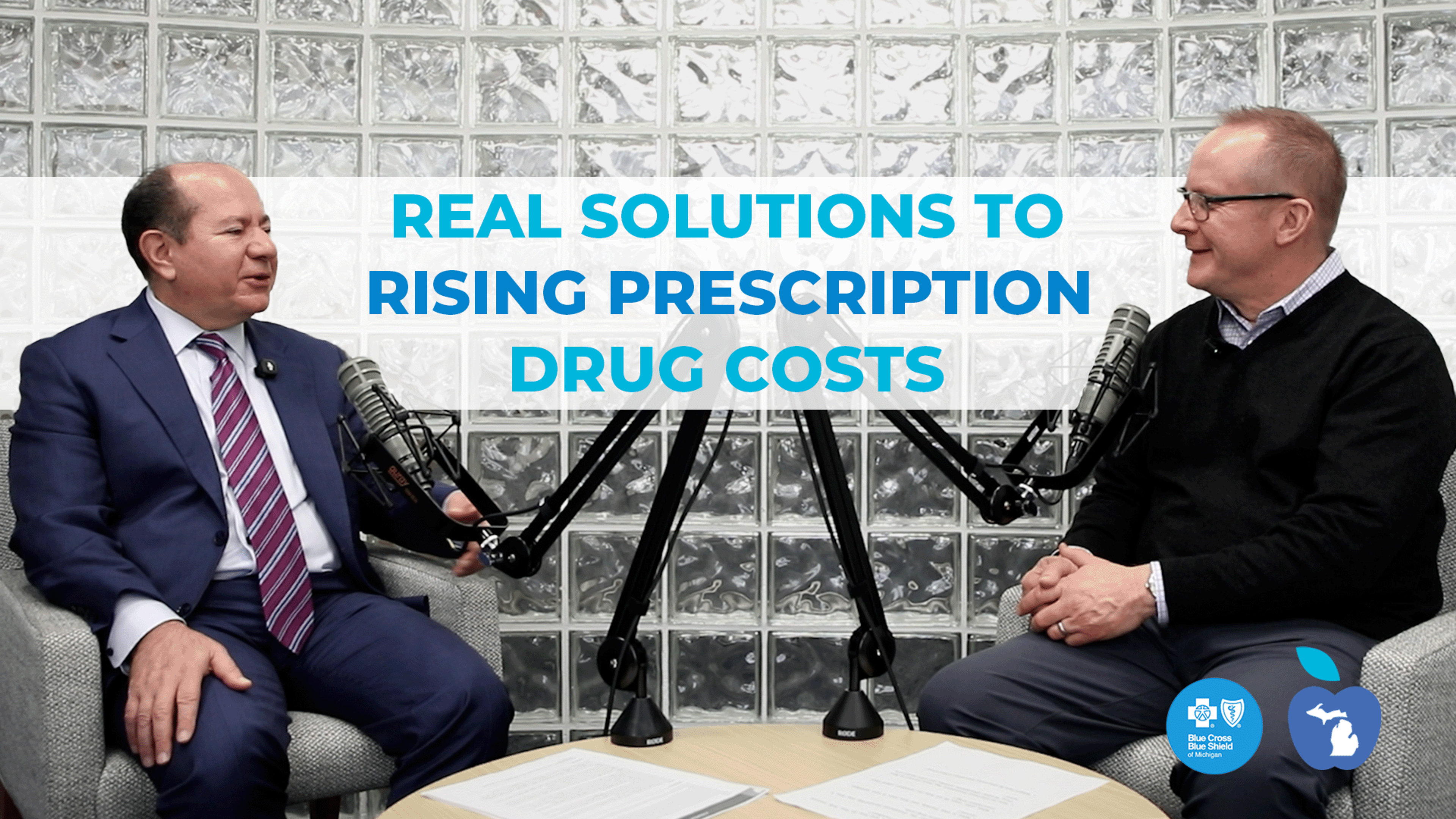How to Overcome Perfectionism
| 1 min read

00:00
00:00
About the Show
On this episode, Chuck Gaidica is joined by Sydney Lipsey, Manager of Behavioral Health Strategy and Planning for Blue Cross Blue Shield of Michigan. Together, they discuss ways to overcome perfectionism.
In this episode of A Healthier Michigan Podcast, we explore:
- Signs of perfectionism
- Effects of perfectionism on mental health and wellbeing
- Ways to overcome perfectionism
Transcript
Here is the full transcript of this episode. You can listen to the audio version on streaming platforms or watch on YouTube.
Chuck Gaidica:
Do you focus on progress or perfection? If it's the latter, it could be impacting your well-being. This is A Healthier Michigan Podcast, episode 165, and coming up we discuss how to overcome perfectionism.
Do you focus on progress or perfection? If it's the latter, it could be impacting your well-being. This is A Healthier Michigan Podcast, episode 165, and coming up we discuss how to overcome perfectionism.
Welcome to A Healthier Michigan Podcast. It's a podcast dedicated to navigating how we can improve our health and well-being through small, healthy habits that we can start. Right now. I'm your host, Chuck Gaidica, and every other week we'll sit down with a certified expert and we discuss topics that cover nutrition, fitness, and a lot more. And on this episode, we're taking a dive into the deep end of the pool on how we can identify or not with perfectionism, and then how can we overcome it if it's an issue. With me today is Manager of Behavioral Health and Strategy and Planning for Blue Cross Blue Shield of Michigan, Sydney Lipsey. Good to see you again.
Sydney Lipsey:
It's nice to see you. Thanks for having me back.
Chuck Gaidica:
Oh, sure thing. And I think this may be the first time I ever want to quote of a well-known name of this era, Voltaire. He has a great quote. Voltaire says, "Perfect is the enemy of good." And I suspect that could be the case for a lot of people. For those that strive for perfection, they might be setting up for good enough and say, that's easier said than done in their life. Accepting anything less might feel like failure, right? I mean, I think that if the bar is really high for a lot of us, then we kind of think every day it could be a failure, maybe. And if we constantly see imperfections as unacceptable, then I guess a grand question is how does that impact our well-being? So do you relate to any of this idea of being perfect?
Sydney Lipsey:
Yeah, this is actually something that I've dealt with in my professional life because I have very, very high standards and I want to make sure that when I'm turning in a report or a presentation that it's the best presentation or the best project that I can provide. So essentially that it's perfect, but it does have pitfalls because nothing is perfect. So you're constantly striding for something that isn't exactly there. And I think recognizing that for me was the first step, but it can be very hard to recognize.
Chuck Gaidica:
So how do you recognize that in yourself? And then I want to double back to this because I've got another question, but how do you recognize it in yourself? Do you start to feel any angst? Do you just see that it's taking you longer to get every I dotted and T crossed? How does that work out?
Sydney Lipsey:
Yeah, so I think some of the things too are identifying the signs of being a perfectionist, and some of them aren't necessarily what you would think of. So some of them are you are a perfectionist in all things in all areas, so you want everything to be perfect everywhere. But some of the lesser known or some of the less obvious ones are really being all or nothing with something. You're all in, or you really don't want anything to do with it. And I think this one makes sense to me because if you're all in, you're going to try to make it perfect, but if you can't, then it's like why even try? Some of the other things too are being very critical of yourself and others, being a procrastinator or even feeling defensive when others provide feedback to things and craving approval, wanting to make sure that people are receptive to what you're providing and that they're approving of it. So those are some of the signs too that might not be as obvious to being a perfectionist.
Chuck Gaidica:
And isn't there a fine line in there? I mean, you are setting a high bar for submitting a report, let's say. I would suspect that in your vocational life, your jobs, and even in your hobbies, that being a perfectionist, if you're a skydiver or you're an instructor that wants to teach me how to jump out of an airplane, I would hope you're pretty close to perfect, right? So I mean, there are things where those kinds of traits probably come in very handy too.
Sydney Lipsey:
Definitely. And I think any position or any vocation that's really detail-oriented, accounting or engineering, those are our areas where I think you could see more of this because there are so many details that are involved with that.
Chuck Gaidica:
So let's talk about that idea that you are leaning into perfectionism. You've even recognized it, so you maybe are setting the bar high for yourself, which could be setting yourself up for recurring failure or at least a diminished effect. You're not quite getting there. But then you're also looking at others, your children, your spouse, the world around you, and you're saying, "Well, they just don't mow the grass like I could." So I mean, we see that in our daily lives a little bit in each of us and then probably in others around us. How does that feeling though manifest if you're not saying it out loud? How do you start to feel emotionally or mentally, and how can that impact your health?
Sydney Lipsey:
Yeah, so it can definitely cause stress. That's I think typically where it can start. It can also lead to burnout, anxiety, depression. It can also lead to some low self-esteem, lots of frustration, and those can spill over into other areas of your life too. So then it becomes, it's not isolated to only the thing that you are trying to have perfect.
Chuck Gaidica:
And that's interesting when you talk about depression, you would think that if you're shooting for perfectionism, I guess this is probably just me, I'm thinking I'm conjuring up in my mind this image of somebody who's constantly in the mirror being perfect, their perfection leads to egotism. So I'm thinking, well, it goes the other way. You're saying that it can actually start to take you in a negative route because you aren't achieving those levels that you've kind of set the bar for, right? Yeah.
Sydney Lipsey:
Or you've set the level so high and you can't achieve it. So it doesn't matter how long you're spending in the mirror primping and things like that. It just becomes an unobtainable in your mind.
Chuck Gaidica:
There's probably a balance there, right? Being perfect every once in a while in your report and then going home and saying, "Well, I did my best today with the kids. It's okay." I suspect that that leads to more healthfulness where you're not maybe obsessing. Is that a good word, that we should try to be avoiding in our lives? We're not obsessing with perfectionism.
Sydney Lipsey:
And I think that there are some ways to get around or some ways to deal with it when you do notice those perfectionist tendencies, there are some ways to mitigate those. And like I said, the first one is really identifying what you want to be perfect and trying to see is there a root cause behind that? Do I just want approval from the people that I'm providing a report from? Do I want to impress them? Do I just want to show myself that I can do it? And maybe kind of peeling back the layers of that onion to see if you can figure out what is driving that perfectionism. That's one way to start it. Looking at the bigger picture too is also a way to kind of mitigate those to say, okay, so if I turn in a report and it's perfect, in the bigger picture, how does that impact my performance at work? How does that impact the company's performance? How does that impact our relationship with the customer that we are providing the report to and things like that.
So sometimes looking at that can help. You realize that maybe it doesn't have to be perfect, maybe good is where it can be.
Chuck Gaidica:
Yeah, good is good enough. Right?
Sydney Lipsey:
Mm-hmm.
Chuck Gaidica:
Do you find in your history with people or people even anecdotally around you, it would seem to be a dangerous combination that you're leaning into perfectionism and you're not self-aware, right? That you're leaning into it and you're trying to impress the boss with reports one after another, but you have nobody speaking truth or you're not going to anybody and saying, "Hey, can you just let me know, am I being too much of a nitpicker on this?" Because if you're not self-aware already, maybe it is a good idea to reach out to somebody and just ask them for a little advice or something.
Sydney Lipsey:
And even just a check-in too. And if it's something at work, even just checking in with the person, with your team or your boss to ask, how are things going? Is there anything that I am focusing too much on? Is there anything that I should be focusing more on? And just shifting your perspective with things like that.
Chuck Gaidica:
You talked about this idea of mental health and wellbeing. So when your perfectionism begins to affect you and led to some of the outcomes, depression or anxiety, how would you start to feel? Does that manifest itself physically too? If I'm getting anxious and I can't really figure out why, is that a good place to check yourself and say, well, what's going on with me? What's happening?
Sydney Lipsey:
And I think it's different for everyone because stress affects everyone differently. So for some people, they may feel more anxious, and for them, anxiety might feel like butterflies in their stomach or heart racing, not being able to sit still. For others, it could be racing thoughts, things like that. For other people, stress impacts them in a way where maybe it's not anxiety, but it still is more of a physical manifestation. So it could be aches and pains, headaches, things like that. So I think being aware of how stress affects your body, how it affects you personally, can be a big indicator too of how to identify when you're in those stressful times. And just take note of that.
Chuck Gaidica:
So when you start to think about this idea, are there other avenues for perfectionism we haven't touched on that maybe wouldn't even be apparent to us?
Sydney Lipsey:
Let me think about that one for a second. So I think...
Chuck Gaidica:
I'll give you an example in my life.
Sydney Lipsey:
Yeah.
Chuck Gaidica:
So I am out power washing the bricks as you walk up the front of the house, 'cause it's time. They're just kind of getting grungy and there's stuff in the cracks. And I thought, oh, I'll get out the little power washer. So I do that and I get down to where it hits the sidewalk, the public sidewalk, and I look at the sidewalk and I'm like, well, that looks kind of grungy in front of my house. I'll just power wash the sidewalk. Now, nobody is going to see that from the street. Nobody's going to say, "Man, they've got the brightest sidewalk in the world." But for me, and I guess this kind of falls into that category, it doesn't matter. I'm not going to eat off the sidewalk. Nobody's going to crawl on it. So I just do it and I forget about it.
Yesterday day before, our daughter-in-Law, who's in with our son, and our grandson, took him for a walk in the stroller. She comes back and she says, "Yo, I just walked over your sidewalk. I can really tell a difference." I'm thinking, okay, see, that was it. But I wasn't really aching for that, and yet it felt good that I got a response. So to me, that's more of a normal reaction on the back end. Now, on the front end, people may say, "What do you mean you power washed your sidewalk?" It's like, it took me half an hour. I got the gizmo. It's no big deal. So I do relate to some of this, but it never gives me angst per se. Maybe it does take up a little of my time, I guess.
Sydney Lipsey:
Yeah. And I think that there was an important distinction there too for you, is that it's not something that you were focusing on of, because I wash this, I have to wash the sidewalk as well and making it all match essentially, so that if the fence is clean, the sidewalk is clean. But I think where it starts to shift over into more problematic is when it is starting to have those manifestations where you're staying up late to work on reports. You're staying up late to work on papers, even though it's already been done, you're trying to make it better. You're trying to make it perfect. You're not eating, you're missing meals, you're not sleeping or you're not taking care of yourself, so you're skipping your normal day-to-day hygiene activities and things like that. So if it starts to shift into that, that's where I think it becomes a little more problematic for your own life.
Chuck Gaidica:
I was not power washing at midnight way after sunset. So I'll just say that for the record, Sydney. So if we now are recognizing even little bits of what you're talking about in ourselves, what are the ways that we can overcome this perfectionism? Even if it's something as simple as breathing deeply. We talk a lot in this podcast about self-care, mindfulness, finding time to sit and relax. So I mean, some of that seems like it can also weave its way into this idea too, right?
Sydney Lipsey:
Yeah, absolutely. And I think there are several things. So there are some things that you can do on your own and see if those are successful. And there's also ways that cognitive behavioral therapy can help as well. You can start off with looking at things like recognizing your successes, recognizing what you've achieved so far throughout the process or throughout the project. And I think that's one area that a lot of us overlook is celebrating those successes along the way. Deep breathing is another one. When you notice that stress starting to manifest in your body, just taking a step back, taking a few deep breaths, bringing the heart rate back down and just kind of centering is another way to do it. But cognitive behavioral therapy is if it starts to shift into that area where you are staying up late, you are skipping meals because you're focused so much on this one area that you're forgetting about the other things. That's something that can help as well.
Chuck Gaidica:
And what is that? When you say cognitive behavioral therapy, what is that?
Sydney Lipsey:
Cognitive behavioral therapy is a form of psychotherapy or talk therapy where they focus on the relationship between your thoughts, your actions, and your behaviors. So it focuses truly on shifting your thought process and helping you identify how your thought process is interacting with your day-to-day life, and how you're getting those outcomes just based on how your thoughts can lead to different actions, which can lead to different outcomes, and it can kind of cycle that way. So it really focuses on shifting your thought pattern. So instead of shifting to say, I need this paper to be perfect, you can start to shift your thought patterns to say, I know the criteria that needs to be included. Let's make sure all of that's included in the paper or in the report that I'm providing. So then it goes from having it be perfect to having it meet the standards.
Chuck Gaidica:
Yeah, that's interesting. And when I mentioned having self-awareness, I wasn't being hyper critical of anybody that may not, but I think this behavioral therapy would be a way of looking at a person you can talk to because maybe you don't have anyone else who is there to speak truth or you don't feel confident enough to get their input. So for many, I would suspect this is pretty powerful, this therapy.
Sydney Lipsey:
It's a very, very effective modality of therapy. When you have someone who is trained in cognitive behavioral therapy, they can work through those sessions in that process with you. There's lots of other materials too that they might give you, like workbooks or handouts and things to help you learn the process and focus on the process.
Chuck Gaidica:
You said something else, and then I want to wrap it up, but you said something about almost like creating, in my mind, I was taking little check marks of when I became my new version of perfect, not perfect, but better. And I suspect for some people who are living a life where they feel like, well, I'm procrastinating, I can't get things done, to put a little check mark on a calendar to physically see that you have done some things to a new level of better to give you some wins, that may be a very helpful thing. That may not be a bad thing.
Sydney Lipsey:
I completely agree. I think that that's, again, celebrating those little successes along the way and taking a step back to see the progress that you've made.
Chuck Gaidica:
Well, we've had a lot of success here. I mean, a lot of great stuff. Do you have any takeaways you want to leave for the audience, Sydney?
Sydney Lipsey:
Yeah, I think the biggest thing that I would say, and Chuck, you actually brought it up, is that being wanting to have things a particular way doesn't necessarily mean you're a perfectionist. So if you want to power wash the sidewalk, as long as it's not impacting your life in a negative way-
Chuck Gaidica:
I'm not out in the thunder and lightning after midnight. Yeah, that's a problem.
Sydney Lipsey:
But if those things aren't impacting your life in a negative way and it's making you happy, by all means carry on. But if you are starting to notice those knots in your stomach when you're trying to work on things or you're procrastinating because you just don't know how to do something the right way, or things like that, those might be times to kind of say, maybe this is something that I do need to look into and check in there. So just those first steps.
Chuck Gaidica:
Well, it's great to see you. Thanks for all the wisdom.
Sydney Lipsey:
It was great seeing you again. Thanks so much.
Chuck Gaidica:
Oh, sure thing. With us today is the manager of behavioral health strategy and planning for Blue Cross Blue Shield of Michigan, Sydney Lipsey. We're glad you've been with us. Thanks for listening to a Healthier Michigan podcast. It's brought to you by Blue Cross Blue Shield of Michigan. If you like the show, you want to know more, you can check out our new refreshed website at ahealthiermichigan.org/podcast. You can leave us reviews or ratings on Apple Podcast or Spotify. You can also follow us on Facebook, Instagram, or Twitter. We've got a YouTube channel. You get all the new episodes, old episodes, take them with you on your smartphone or tablet, and be sure to subscribe to us on Apple Podcast, Spotify or your favorite podcast app. I'm Chuck Gaidica. Be well.





